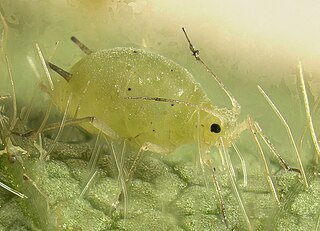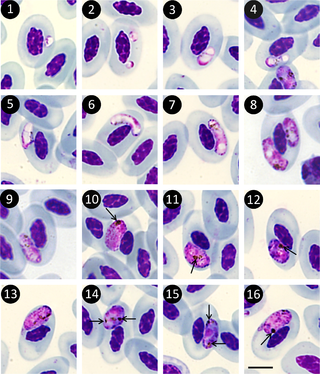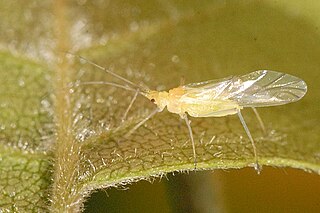
Hoverflies, also called flower flies or syrphids, make up the insect family Syrphidae. As their common name suggests, they are often seen hovering or nectaring at flowers; the adults of many species feed mainly on nectar and pollen, while the larvae (maggots) eat a wide range of foods. In some species, the larvae are saprotrophs, eating decaying plant and animal matter in the soil or in ponds and streams. In other species, the larvae are insectivores and prey on aphids, thrips, and other plant-sucking insects.

The Ixodidae are the family of hard ticks or scale ticks, one of the three families of ticks, consisting of over 700 species. They are known as 'hard ticks' because they have a scutum or hard shield, which the other major family of ticks, the 'soft ticks' (Argasidae), lack. They are ectoparasites of a wide range of host species, and some are vectors of pathogens that can cause human disease.

Potyviridae is a family of positive-strand RNA viruses that encompasses more than 30% of known plant viruses, many of which are of great agricultural significance. The family has 12 genera and 235 species, three of which are unassigned to a genus.

The Aphididae are a very large insect family in the aphid superfamily (Aphidoidea), of the order Hemiptera. These insects suck the sap from plant leaves. Several thousand species are placed in this family, many of which are considered plant/crop pests. They are the family of insects containing most plant virus vectors with the green peach aphid being one of the most prevalent and indiscriminate carriers.

The Hypocreales are an order of fungi within the class Sordariomycetes. In 2008, it was estimated that it contained some 237 genera, and 2647 species in seven families. Since then, a considerable number of further taxa have been identified, including an additional family, the Stachybotryaceae. Wijayawardene et al. in 2020 added more families and genera to the order. According to the Catalog of Life, As of April 2021 the Hypocreales contains 6 families, 137 genera, and 1411 species. Hyde et al. (2020a) listed 14 families under Hypocreales, while, Wijayawardene et al. (2022) accepted 15 families in the order, where Cylindriaceae was additionally added. Earlier, Hyde et al. (2020a) had placed Cylindriaceae in class Xylariomycetidae. Samarakoon et al. (2022) agreed. Hence, Cylindriaceae should have been excluded from Hypocreales and placed in Xylariomycetidae. Xiao et al. (2022) recently introduced a new family Polycephalomycetaceae to Hypocreales.

Evaniidae is a family of parasitoid wasps also known as ensign wasps, nightshade wasps, hatchet wasps, or cockroach egg parasitoid wasps. They number around 20 extant genera containing over 400 described species, and are found all over the world except in the polar regions. The larvae of these solitary wasps are parasitoids that feed on cockroaches and develop inside the egg-cases, or oothecae, of their hosts.

Lepicerus is a genus of myxophagan beetles containing three described species in the family Lepiceridae; it is the only extant genus in the family, with another genus, Lepiceratus only known from fossils. Extant species occur in the Neotropics, from Mexico south to Venezuela and Ecuador. Fossils referrable to the genus are known from the early Late Cretaceous of Southeast Asia.

The Haemosporida are an order of intraerythrocytic parasitic alveolates.

Kateretidae also known as short-winged flower beetles are a family of beetles in the superfamily Cucujoidea. There are 10 extant and 4 extinct genera, and at least 40 described species. They are found worldwide except in New Zealand. Adults are anthophagous, feeding on flowers, while the larvae are spermatophagous inside the flower corolla.

Phylloxeridae is a small family of plant-parasitic hemipterans closely related to aphids with only 75 described species. This group comprises two subfamilies and 11 genera with one that is fossil. The genus type is Phylloxera. The Phylloxeridae species are usually called phylloxerans or phylloxerids.

Calaphidinae is a subfamily of aphids in the family Aphididae. There are more than 60 genera and 360 described species in Calaphidinae.
Cretacimermis is a collective group genus of fossil mermithid nematodes from the Cretaceous that cannot be placed in extant genera.
Parvaverrucosa is an insect genus in the extinct, monotypic family Parvaverrucosidae, of the order Hemiptera. It contains the monotypic species Parvaverrucosa annulata known from the Cenomanian aged Burmese amber of Myanmar. First described in 2005, the genus was redescribed in 2019, which found it to be in the superfamily Palaeoaphidoidea
Ellinaphididae is an extinct family of aphids in the order Hemiptera. There are about 13 genera and more than 40 described species in Ellinaphididae.
Juraphididae is an extinct family of aphids in the order Hemiptera. There are at least three genera and about five described species in Juraphididae. The most recent discovery in Juraphididae family was the Prolavexillapis munditia in 2018 and Isolitaphidae are synonymy with the Juraphididae
Lebanaphididae is an extinct family of aphids in the order Hemiptera. There are at least two genera in Lebanaphididae.
Mesozoicaphididae is an extinct family of aphids in the order Hemiptera. There are at least four genera and about seven described species in Mesozoicaphididae.
Naibiidae is an extinct family of aphids in the order Hemiptera. There are at least three genera and four described species in Naibiidae.
Szelegiewicziidae is an extinct family of aphids in the order Hemiptera. There are about 6 genera and 10 described species in Szelegiewicziidae.

Mesophyletidae is an extinct family of weevils known from a number of genera preserved in Cretaceous amber. The family was first described as a subfamily in the extant family Caridae, and subsequently raised to family status in 2018.











